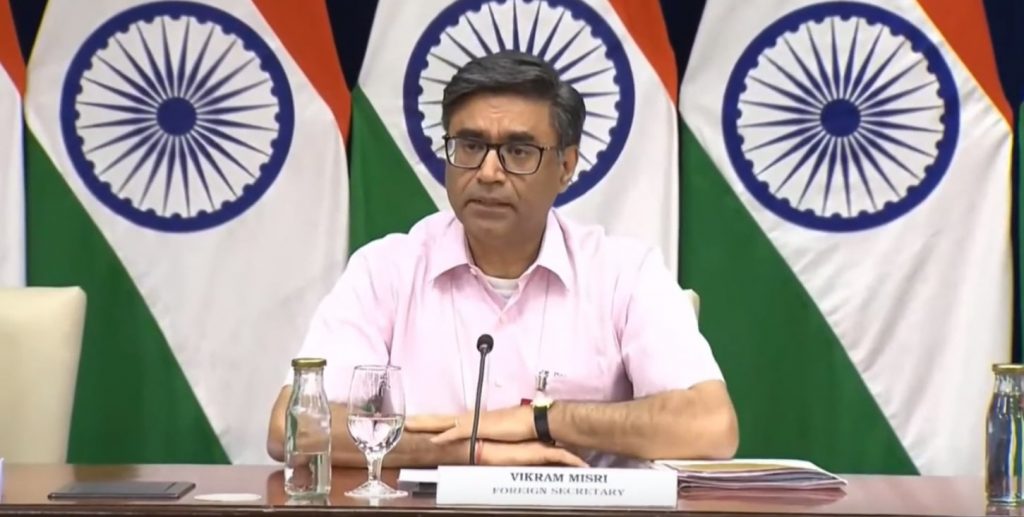NewsGate Press Network
A day after Pakistan sponsored massacre of 28 tourists at point blank range in Pahalgam, India has announced a significant and strong measures including stoppage of Indus river treaty which effectively means prevention of water flowing into Pakistan specially of Indus, Chenab and Jhelum rivers.
Foreign Secretary Vikram Misri issued a press statement late on Wednesday evening 23rd of April 2025 after a two hour long meeting of the Cabinet Committee on Security (CCS) chaired by the Prime Minister Narendra Modi.
The trading and tourist crossing facility at Wagha-Attari border check post has been shut down.
And those Pakistani nationals who have been issued SAARC visas have been asked to leave India in next 48 hours.
The three defence officers in posted in Pak’s diplomatic office in New Delhi have been declared Persona Non Grata. They have been asked to leave India in next seven days.
Following is the full statement of Foreign Secretary –
“The Cabinet Committee on Security (CCS) met this evening under the Chairmanship of the Prime Minister. The CCS was briefed in detail on the terrorist attack on 22 April 2025 in
Pahalgam, in which 25 Indians and one Nepali citizen were killed. A number of others sustained injuries. The CCS condemned the attack in the strongest terms and expressed its deepest condolences to the families of the victims and hoped for the early recovery of the injured.
Strong expressions of support and solidarity have been received from many Governments around the world, which have unequivocally condemned this terror attack. The CCS recorded its appreciation for such sentiments, which reflect zero tolerance for terrorism.
In the briefing to the CCS, the cross-border linkages of the terrorist attack were brought out. It was noted that this attack came in the wake of the successful holding of elections in the Union Territory and its steady progress towards economic growth and development.
Recognizing the seriousness of this terrorist attack, the CCS decided upon the following measures:
(i) The Indus Waters Treaty of 1960 will be held in abeyance with immediate effect, until Pakistan credibly and irrevocably abjures its support for cross-border terrorism.
(ii) The Integrated Check Post Attari will be closed with immediate effect. Those who have crossed over with valid endorsements may return through that route before 01 May 2025.
(iii) Pakistani nationals will not be permitted to travel to India under the SAARC Visa Exemption Scheme (SVES) visas. Any SVES visas issued in the past to Pakistani nationals are deemed cancelled. Any Pakistani national currently in India under SVES visa has 48 hours to leave India.
(iv) The Defence/Military, Naval and Air Advisors in the Pakistani High Commission in New Delhi are declared Persona Non Grata. They have a week to leave India. India will be withdrawing its own Defence/Navy/Air Advisors from the Indian High Commission in Islamabad. These posts in the respective High Commissions are deemed annulled. Five support staff of the Service Advisors will also be withdrawn from both High Commissions.
(v) The overall strength of the High Commissions will be brought down to 30 from the present 55 through further reductions, to be effected by 01 May 2025.
The CCS reviewed the overall security situation and directed all forces to maintain high vigil. It resolved that the perpetrators of the attack will be brought to justice and their sponsors held to account. As with the recent extradition of Tahawwur Rana, India will be unrelenting in the pursuit of those who have committed acts of terror, or conspired to make them possible.”
It may be recalled that the Indus Water Treaty (IWT) was a water-distribution treaty between India and Pakistan arranged and negotiated by the World Bank, to use the water available in the Indus River system that includes its tributaries .
Historically speaking this treaty was signed in Karachi on 19th of September 1960 by then Indian Prime Minister Jawaharlal Nehru and then Pakistani dictator Ayub Khan.
The Treaty gives control over the waters of the three “Eastern Rivers” namely the Beas, Ravi and Sutlej located in India while control over the waters of the three “Western Rivers” – the Indus,Chenab and Jhelum to Pakistan.
India got about 30% of the total water carried by the Indus Rivers System located in India while Pakistan got the remaining 70 percent.
The treaty allows India to use the water of Western Rivers for limited irrigation use and unlimited non-consumptive uses such as power generation, navigation, floating of property, fish culture, etc.
It also lays down detailed regulations for India in building projects over the Western Rivers.


Comments are closed for this post.